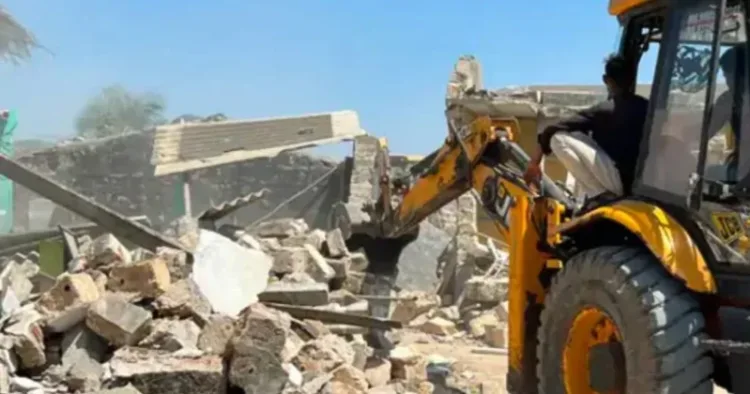Bet Dwarka, a revered island in Gujarat known as the sacred home of Bhagwan Krishna, has become a battleground to reclaim its spiritual sanctity. Over the years, the island, steeped in religious significance, has witnessed a surge of illegal constructions, including residential, commercial, and religious structures built predominantly by non-Hindus primarily who are Islamists. In a decisive move, the Gujarat government has demolished 52 such unauthorised properties in a high-profile operation under heavy security.
This massive cleanup campaign, aimed at reclaiming the holy land and safeguarding its cultural and religious heritage, marks a critical step in addressing decades of illegal encroachments on government land in the region.
Bet Dwarka, located off the western coast of Gujarat, is not just a geographical location but a spiritual epicenter for Hindus worldwide. The island houses a centuries-old temple dedicated to Bhagwan Krishna, believed to be his dwelling place during his reign in Dwarka. Millions of devotees visit annually to pay homage to their deity.
However, beneath this sacred veneer lies a troubling reality. Over the years, unauthorised constructions by non-Hindus have mushroomed across Bet Dwarka, encroaching on Gauchar (grasing) lands and government properties. These illegal structures have not only compromised the island’s sanctity but also posed significant security challenges, with intelligence reports linking some activities to banned groups.
The latest demolition drive, launched by the Bhupendra Patel government, has focused on razing illegal constructions in the Balpar area of Bet Dwarka. Over 1,100 police personnel, including senior officers, have been deployed to ensure the operation’s success. Drone cameras have been deployed to monitor the extensive clearing effort, which is expected to continue for several days.
According to SDM Amol S. Awate, “Around 35 houses built on Gauchar land have already been demolished today. Two prior notices were served under Section 185 of the Gujarat Municipality Act, 1963, and a public hearing was conducted to verify documents. Structures without valid authorisation are being systematically removed.”
While 52 structures have been demolished, the operation is far from over. A religious structure under court-imposed stay is slated for demolition after January 20, pending further hearings. The government has pledged to continue its zero-tolerance policy toward illegal encroachments, affirming that faith and security are non-negotiable priorities.
Authorities have assured that the daily worship and rituals at the Shree Krishna temple will not be disrupted, even as pilgrim access to the island remains temporarily restricted.
This demolition drive is the second major operation in Bet Dwarka following an earlier campaign in 2022, during which 35 illegal structures were removed. Despite these efforts, a re-survey revealed additional unauthorised buildings, necessitating renewed action.
Reports have linked some encroachments to banned Islamist organisations, raising alarms over the misuse of the island’s strategic location on Gujarat’s 1,600-kilometer coastline. The government has since prioritised coastal security, addressing the twin challenges of illegal settlements and potential threats.
Harsh Sanghavi, Gujarat’s Home Minister, took to social media to underline the government’s commitment: “Bet Dwarka is the land of faith for millions of Hindus. Illegal encroachments on Bhagwan Krishna’s land will not be tolerated. Protecting our faith and culture is our sacred responsibility.”
The Gujarat government’s bulldoser action is not limited to Bet Dwarka. Similar operations have been conducted across coastal regions like Somnath, Porbandar, and Kutch, with hundreds of acres of land reclaimed from illegal occupants. The coordinated efforts involve multiple departments, including district revenue authorities, state maritime boards, and local police forces.
Despite legal hurdles, such as a stay order on the demolition of a religious structure, authorities remain steadfast. Officials have indicated that once the court hearings are complete, action against these structures will resume without delay.



















Comments